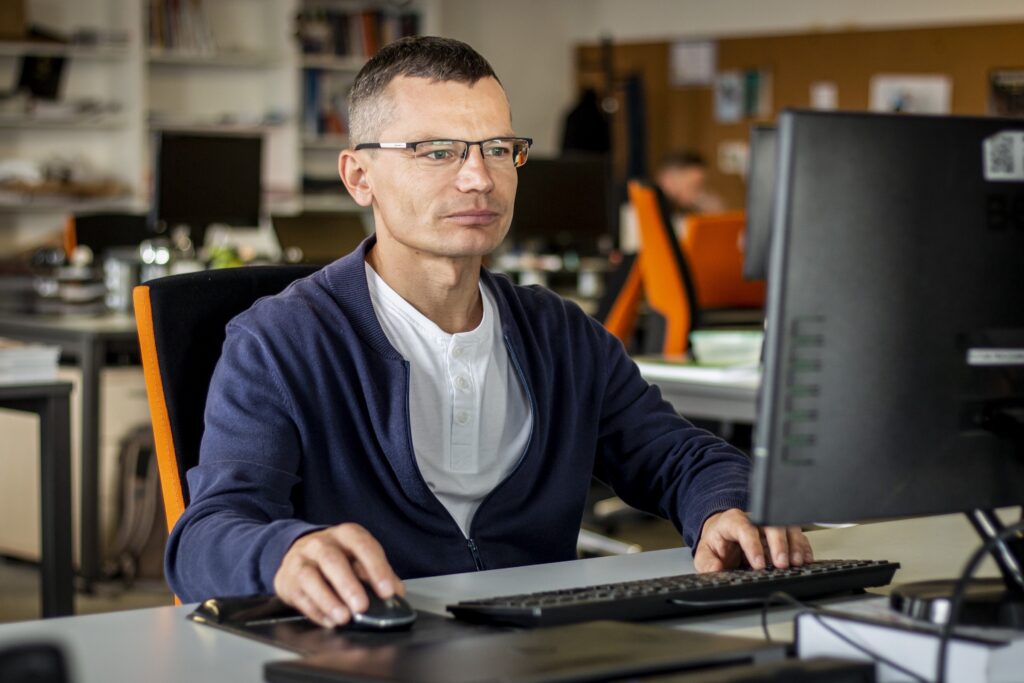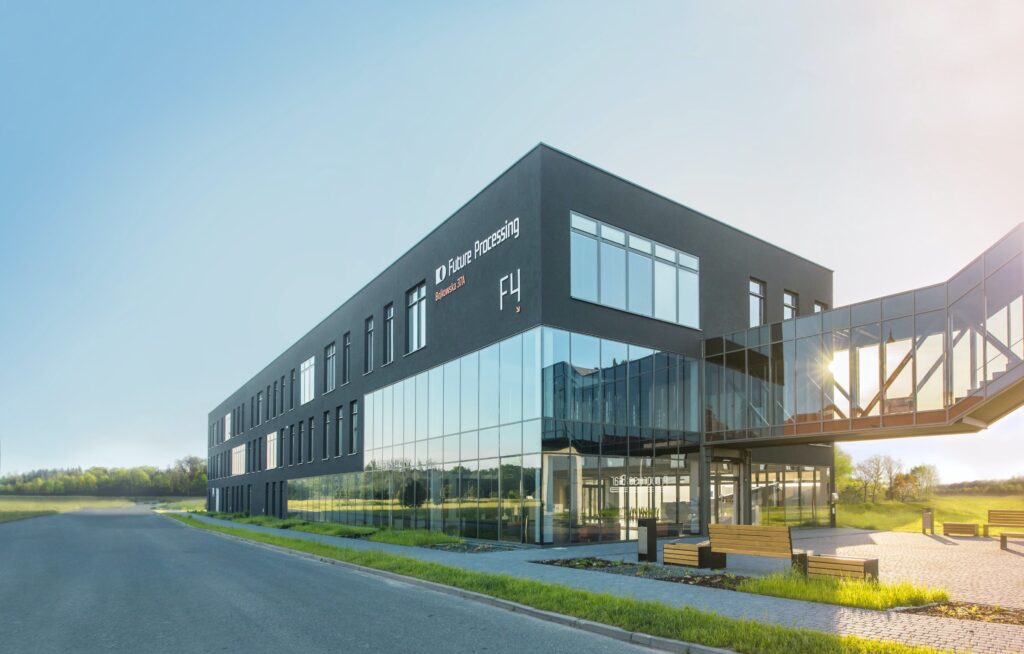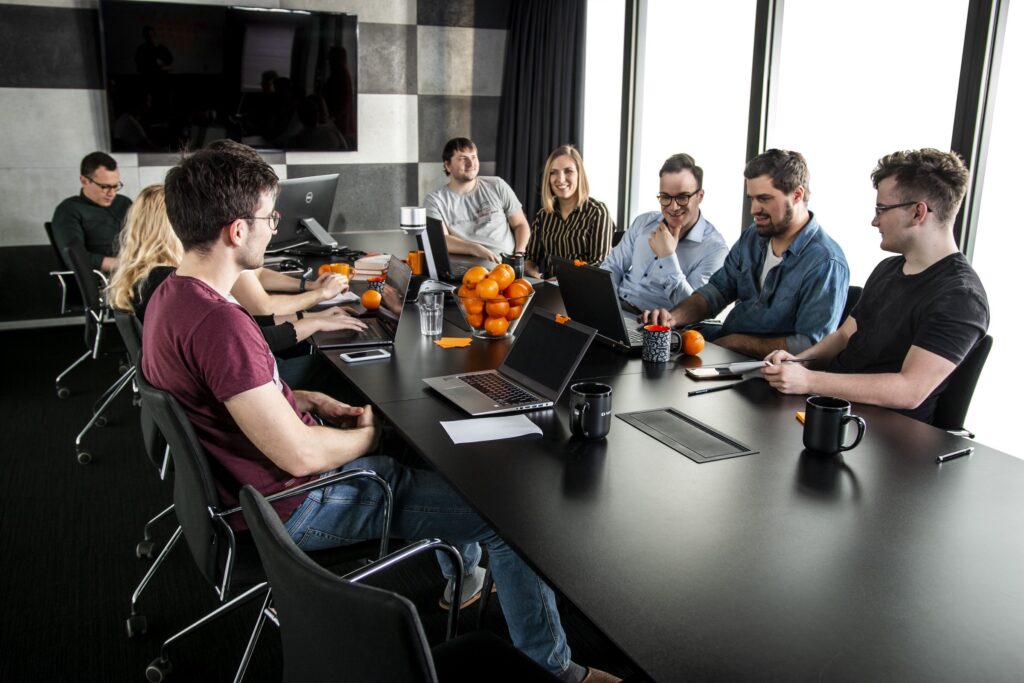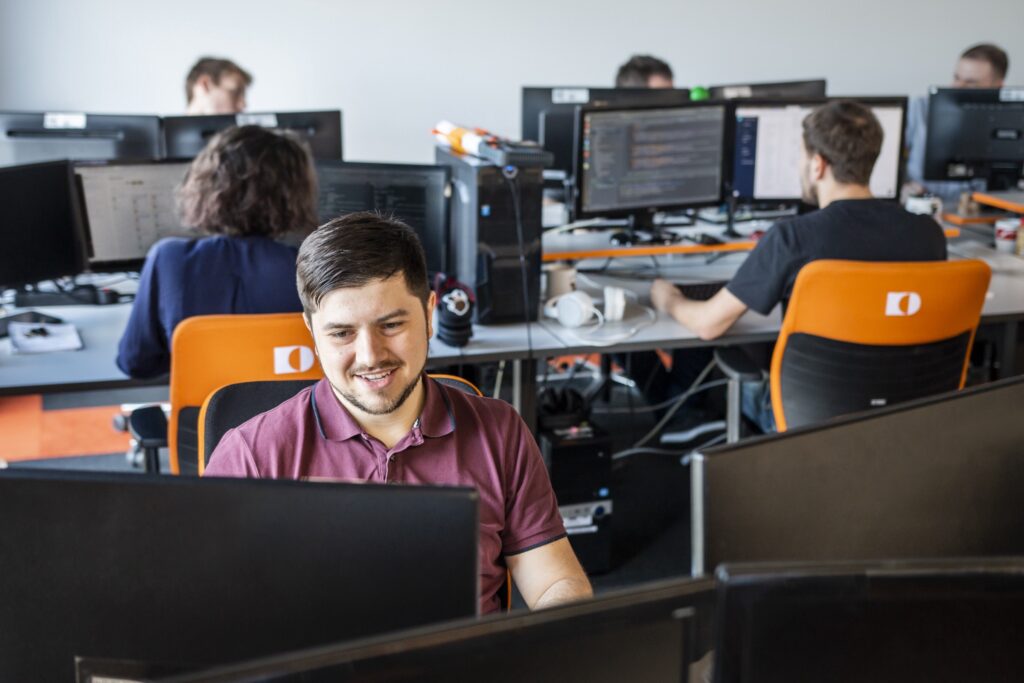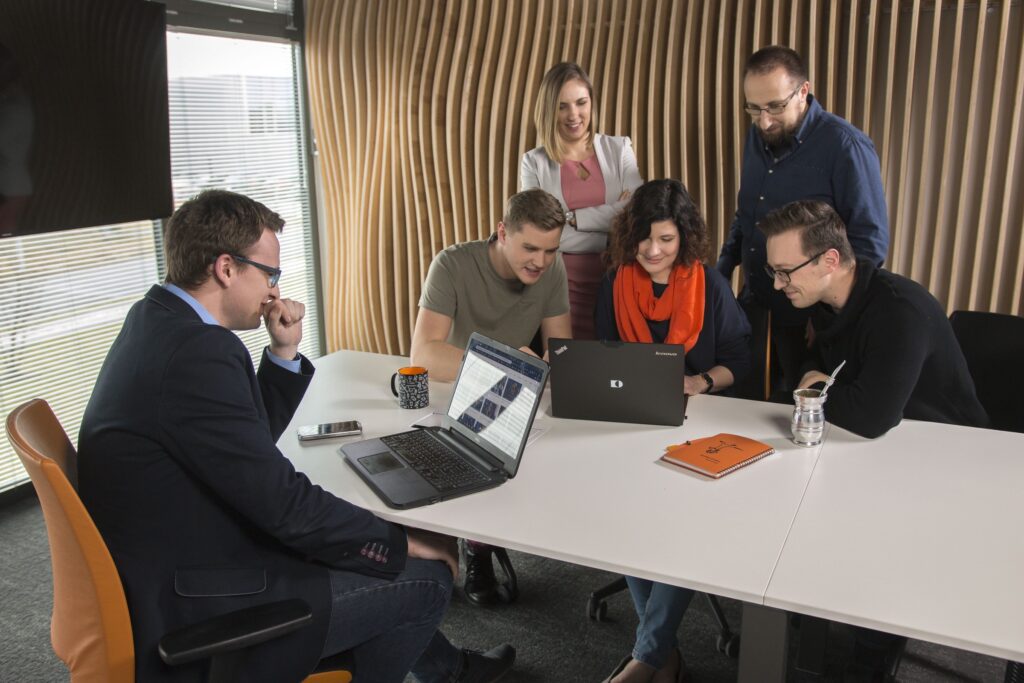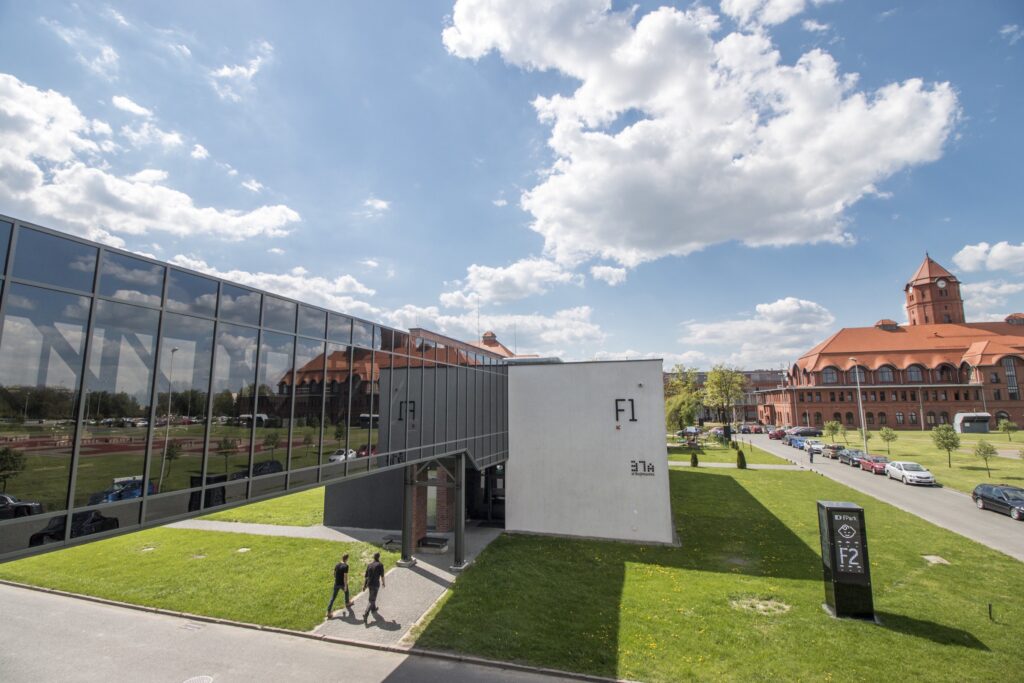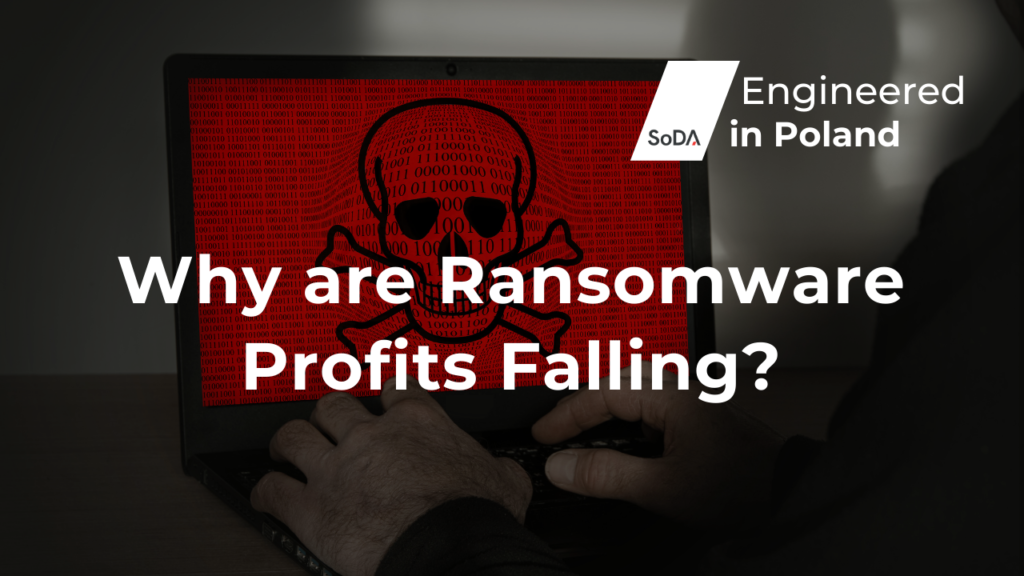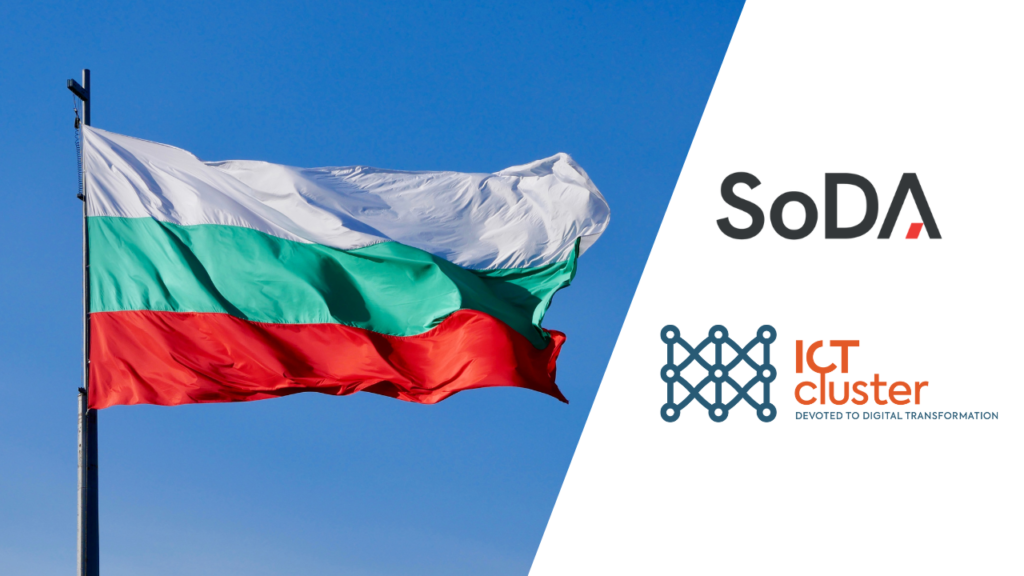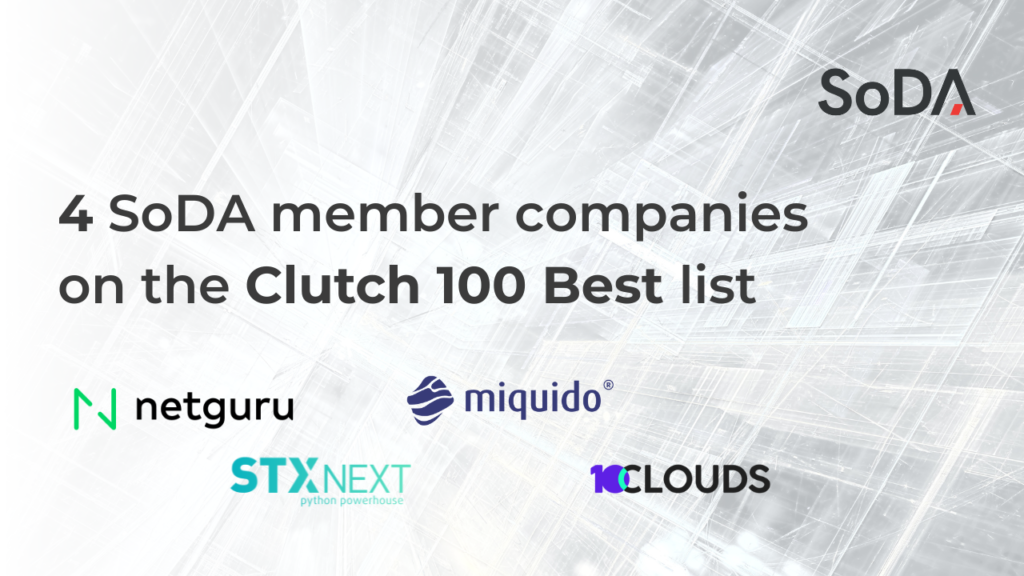SoDA is talking with Paweł Pustelnik, Managing Director of Future Processing (FP for short). The company is one of the biggest Polish software development companies. With 20 years of experience and over 800 people on board, the firm is fully capable of talking about the current state of software development, COVID-19 outbreak, and the future. The industry’s, as well as the company’s alone.
Jarosław Ściślak: Please finish the sentence — The future is…
Paweł Pustelnik: Future Processing, of course! (laughing) Seriously, though — it’s very hard to predict. We are faced with a hard lesson, coming from COVID-19. Not everything is written in stone, not everything is easily predictable. You can’t always prepare for that. But one thing is for sure — technology has rapidly entered the human domain and is here to stay. It’s unavoidable. At FP, we believe that the future will be based on data and its relevance. The ability to sort it out and find out the answers is the crucial element of today’s and tomorrow’s business. The technology will come out of its spawning pool — it will be a large part of human life. Tech is supporting human performance and enhancing life… It’s already a big theme, tomorrow it will become a big reality.
The challenge with this — we don’t know where it leads. Let’s add artificial intelligence (AI) to the mix, and we have a set of exciting but fairly unpredictable ingredients. Me alone and the industry as a whole think about relevance and pacing. Do we necessarily need all of that? At what cost? Shouldn’t we take a breath and take control of the future before it controls us? Future Processing believes that technology can change the world for the better, and our lives can be more accessible. We can save time and spend it with loved ones. At the same time, technological achievements should not dictate who we are and what we do. Everything needs balance.
JŚ: If the future is so unpredictable, and it’s hard to know what developments can make or break us, what role Future Processing will play in it? What role do you want to play in it?
PP: If you ask me about the nearest future, then FP still wants to do what it does best — make quality software that eases human life. We can take it many ways and talk about products, that directly impact the quality of life. But we can also talk about healthcare, where solutions like Sens.AI save lives. This is the system for automating brain scan analysis via magnetic resonance imaging (MRI). The Sens.AI is our own, innovative solution that we deeply believe in. The scale of outliers is pretty big here. We have also worked on advanced systems for fluoroscopy, angiography, and the statistical analysis of medical images used in hospitals, universities, and laboratories. These were based on machine learning techniques.
Today we see the strong demand for that kind of software, but the reality can surprise us, and we will pivot. Some analysts predict AI-based software development shortly, which puts us out of work for good. But what about quality? What about the human element? Ability to understand the business need, similar culture, business values, delivery, and quality control? Can AI do all that? The future is uncertain, but we’re hopeful. I would rather talk about what comes next and what’s within our grasp. The history of the economy shows that the most significant shifts come suddenly. What we can do is to prepare and gain unique human competencies. The secret sauce is creativity. FP is fortunate in that department; we are good at attracting and growing creative talents. Our software developers can translate code into something valuable for clients.
JŚ: Let’s talk about it for a second. Humanization of technology and software development, in particular, is a widely spread trend. It’s visible in content, user experience, and user interface (UX/UI), icons, graphics. Future Processing is a big company, yet you emphasize the human approach. How do you do that correctly, what products are proof of that approach?
PP: I feel like we can talk about a few levels. What is unique about Future Processing and what we are proud of is our company culture. We always bet on the chemistry between people. We want them to feel alive in the hallways, be happy to come and work on products. If they feel and observe the change, they grow and deliver even higher value. Mutual trust is everything. Clients trust us with the business, the team trust the colleague to bring an A-game every single time. The ability to create a healthy work environment was always on the top of my list as a managing director and I think it’s working.
A direct line between a creative environment and a successful product is, naturally, not straight at all. The approach needs consistency and constant growth. But yes, it’s working and we have proofs of that. GetFlow for example is our own IP utilized in energy distribution or water supply. We save money and help save human lives. By optimizing processes, the water usage is lower than before, by supporting software with AI we can search for cancer. Translating company culture into great products isn’t always easy but yes — it can be done.
Money isn’t everything, there are a lot of ways to make money. I think that FP works because profit, mission, and life-altering products overlap.
JŚ: OK, but how does it translate into daily operations? How processes look like, how do you approach tasks? What fuels this creativity of yours?
PP: It begins with scale. We have teams of eight to twelve people. Small enough to communicate, pivot, and deliver quickly, big enough to deliver at all. Cooperation with the client is also crucial. Clients usually tell us what they need, leaving ‘how’ entirely to us. That’s the occasion for creative and often nonstandard solutions. Two-week sprints for eight to twelve people are more than enough to talk things through and process them in a way that is optimal for the product itself. Teams are fully independent and act on what they want to deliver, rather than what has to be done. We also don’t run from challenges and mistakes. It’s important to tackle them on the floor, during sprints. Discuss what went wrong, what can be improved, etc. The culture of open communication is key. We could create processes and rules talking about the necessity of communication but I think they are expandable. People actually want to talk to each other! They feel safe, respected, and heard. That approach crosses over to clients — Product Owners like to listen to Future Processing’s feedback, suggestions of improvement, etc.
JŚ. All of it suggests a long way for a company. If you could talk a little about FP’s history, legacy goals, current challenges… What are you aiming for these days, what were the goals five to ten years ago?
PP: The company is 20 years old, I’m here since 2004, so 16 years and counting. Obviously, there’s a lot of history. Jarosław Czaja, FP’s founder, did and still could create a software product for the UK market, working there on a daily basis. We wanted more. With a couple of friends, he decided on coming back to Poland and starting a software development company. The UK market is, by the way, still an important part of our revenue. I guess long relationships and a little bit of quality doesn’t hurt (laughing). The company started from humble beginnings. We operated on recommendations, happy clients brought more clients, and foundations were built. We had to learn everything — things like strategy, marketing, and the role of company culture, that is so beneficial today. Jarek quickly understood that culture could be a significant differentiating factor and strongly bet on it. Strategies evolved, culture stayed the same. We took different routes when it comes to getting clients and making software, but this was constant.
What are FP’s current goals? I think there’s still room to develop software in central Europe, especially in Poland, which has enormous potential, capacity for growth, and an experienced talent pool. In fact, Poland has the best specialists in the world. Don’t take my word for it, ask the clients. Business and product value in Poland is higher than in traditional outsourcing destinations. Future Processing can still educate the market about that. We want to increase our presence in the UK market, and expand in the DACH region (Germany, Austria, Switzerland), which has enormous needs. Lengthy traditions of working with the entire world (like in London) coupled with growing needs (like in DACH) seems to be our natural direction for the moment.
JŚ: You talked a lot about a culture and its impact. Is that the main reason why Polish developers are so valued in the world?
PP: Absolutely. We have a very similar culture than widely understood West. We laugh at the same jokes, we like the same things, but most importantly — we work by using the same methods and within similar time zones. Plus, the work ethic. Polish developer will not code the product. “Development” is here for a reason and means coding and consulting. That’s priceless. At Future Processing, we call it a “natural way of cooperation”.
JŚ: If it’s natural, it has to lead to success. What are your major achievements? Product-wise, in the field of management, running teams?
PP: In the area of our own solutions I’m definitely proud of our healthcare product. I see how our clients work with it — it saves lives. Sens.AI helps in the diagnosis of pathological changes in the brain (low-grade glioma and high-grade glioma). It automatically delivers objective data about the level of the changes and helps doctors understand a patient’s response to therapy. Fully automated analysis was possible through the creation of innovative algorithms, using deep machine learning technique.
I’m also very satisfied with our agile approach. Running a crew of 800 people isn’t easy, especially with multiple clients and projects that overlap in scope, size, and deadlines. Successful management is a direct result of two things — lean methods of making software products and company culture that allows implementing best practices.
JŚ: Let’s talk about current events for a moment and what it means for the development of AI. Some analytics and I don’t say they’re necessarily right, link e-commerce boom of 2003 and 2004 with SARS epidemic. Alibaba grew, Starbucks had to pivot. What role AI will play in the post-COVID-19 world?
PP: I don’t think that COVID-19 will have such relevance and stimulate the growth of AI. I can say what we had observed. Clients will often say to us that they need a machine learning and AI to boost their processes. To be exact — they think they need it. Companies often have a lot of data to go through, sort, and understand. Managers believe that by implementing artificial intelligence, things will magically appear and help them in daily operations. It doesn’t work that way. The solution is fairly simple — we need to create a structure for the data, to make sense out of it. As a software provider, we can offer a tool or even a set of tools for transparency. If the data can be understood by computers, it can be understood by human beings. This process alone sorts all kinds of problems. Artificial intelligence sounds nice but to be honest, it can be implemented only for several specific cases, where we know clients will actually benefit from it. It’s not a magic wand. COVID-19 alone influenced managers in a way that made them think about processes more and software that can help them out. Yes, AI is a topic but we try to steer clients in a little different direction. Structured data help make better decisions. Good data, good choices, better business. That’s the key.
JŚ: Would you then say that the topic of artificial intelligence is an artificially created solution? A one that can help only in a number of very specified business conditions and projects, rather than all clients all the time?
PP: I wouldn’t go that far, saying it’s an artificial solution. What’s true is true, though — people are focused mainly on flashy examples like big e-commerce companies or streaming services. Their systems of analyzing buying processes and tools for suggesting the next interesting piece of content are not going to work for every other business out there. Many people see only poster boys for AI, including these examples, and maybe autonomous vehicles as well. These are not good for many everyday needs.
JŚ: If it’s not AI, then maybe machine learning? I imagine that this solution, coupled with structured data, can be a better fit for most clients.
PP: Well, Machine Learning is a subset of AI but yes, there are examples where it can be beneficial, where it helps with drawing conclusions and driving better decisions, based on historic regularities. We can feed algorithms with data and force them to make the right decisions. A good example would be our client that has a large fleet of excavators. Based on their predicted levels of fuel consumption, with predicted wear and tear, we could save the company a significant amount of money.
JŚ: Future Processing is based in Gliwice. As it happens, the city was the country’s pioneer in implementing 5G technology. What do you think about this future? Is it worth it, relevant, justified by business opportunities? Do you think the tech will be widely utilized by your clients?
PP: Every single analytics I see, predict the large volume of 5G saturation of a market. It can and probably will impact various business models. What we observe right now is a growing demand for the Internet of Things (IoT). The amount of data is growing, and at some point, it will be staggering. I think it will drive even more fluid communication between devices and enable them to make autonomous decisions. For us, it means a hype for algorithms and the need for increased competencies.
JŚ: Let’s shift to a little provocative question. What is more important: outsourcing infrastructure or outsourcing software?
PP: From my point of view — both. They should both be taken into consideration and mutually support each other. We have a great deal of expertise working with Great Britain — and software is that part which worked for That way business efficiency is higher, costs lower, and overall satisfaction is measurable.
JŚ: What role should outsource play in the COVID-19 era, and why? Do you observe the shift towards a digital transformation among your clients?
PP: What we have all witnessed is a global shock. The culture of working from offices had to change rapidly. Managers and their teams had to adapt to face new challenges. Suddenly remote work was not only possible but efficient when it needed to be. Software development can be hybrid, and some people work from the office, some from home. Meeting clients in the office was out of the question. They learned that virtual meetings also work, and it can be done without the loss to the project. Some people are even more productive, without all the noises coming from the teams around them. Managers start to realize that crisis, coupled with the necessity to innovate and remote work, should result in new projects. That’s good for us.
JŚ: It all comes back to the company’s culture. The world slowly but surely goes back to normal. People start to travel again, businesses are reopened. Some with limitations, but still. What role should remote work play in all this? How it impacts software development?
PP: The entire Future Processing shifted to remote work in just one day. Yes, we already worked that way but still — empty offices are not something we were used to. Why was it possible? We were prepared technically; everything was already in place. In some cases, we helped by buying LTE modems, etc. but that were individual cases. I believe the most important lesson that we all can draw from all this, is that responsibility drives it all. Polish people were mostly very responsible during the pandemic, the streets were empty. As a company, we thought about our employees and ways they can continuously deliver value to clients. That’s why additional spending on hardware and software but we like to think of that in the investment category.
JŚ: There is a heated talk about the possible reindustrialization of the West. Production and supply chains are too vulnerable, optimization of internal processes is extremely important, team management crucial, remote work possible, and sometimes necessary. Consumers changed their investment priorities and buying habits, some say permanently. How can software help in this chaotic situation?
PP: Naturally, all depends on a particular situation and business challenges. It’s easier when a company already has a digital presence and distribution channels. If not, all have to be built from scratch, and it takes time. There are no half-measures, though. You can’t do e-commerce half time, with one man and little budget. Either you build a solid online platform to sell the goods and support traditional distribution, or not. Those who thought about supplementation instead of a full-fledged channel, lost. If you look at the transportation sector, where few things could and should be implemented or polished, they’ll tell you they don’t have time. The industry sees the need for innovation but doesn’t have the time to focus on that. There’s simply too much work at the time since e-commerce exploded in early March. Logistics and healthcare are natural candidates for improvement. They both are winners of the COVID-19 situation but need additional investments to fight increased competition. We are now observing the need for processes optimization, demand for software will follow.
JŚ: In a nutshell — it’s always good to come prepared. Especially before the storm.
PP: I think that’s correct. The future is increasingly hard to predict. Especially now, when a few month’s perspective is miles and miles away and no one seems to know nothing. What we see right now is a baby-steps approach. Companies are afraid to invest heavily; they rather pay for smaller projects or elements of them than fully-backed solutions. They want to improve some elements of their infrastructure or software, but they wait with spending money on a complete re-write.
JŚ: If so, what are the three main things that clients should be focused on while browsing for an outsourcing partner?
PP: I’ll give you five. Technical expertise, predictability, strong work ethic, long-term partnership relations, agility. These are five pillars of Future Processing’s Way, as we call it. We know how and can do custom software. We don’t surprise clients with strange things and are flexible enough to change the project when the scope shifts. We value dialogue and lasting relationships. Even now, we help our clients with discounts to balance ‘the COVID-19 effect’. This kind of behavior, taken out of company culture, is what brings people together. Both clients and talents alike.
About the author:
Jarosław Ściślak is an independent branding, marketing, company culture, business scaling, and content specialist. Working with technology companies, he helps to drive revenue and build an image. More on https://www.scislak.com.
